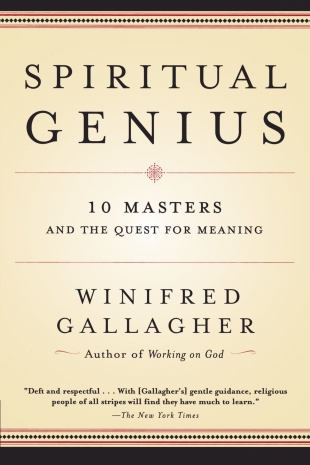In her extraordinary work on spiritual genius, Winifred Gallagher discusses the spiritual practice of meaning.
"All of us use our spiritual genius some of the time. We might not recognize it as such, but we tap it whenever we 'just know' that something is happening for a reason that, to paraphrase Blaise Pascal, 'reason does not know.' Spiritual genius tells us that, despite the chaos and confusion around us, everything is all right, so we might as well be nice. It tells us that if we take on a worthwhile challenge, we'll somehow find the necessary strength and help. It tells us that our true self is more than a bunch of personality traits and problems. Like a compass, spiritual genius always points us toward a reality larger than the ego and the status quo. Once we members of the meaning-seeking species find our place in the grand design, we're able to gather up the pieces of our everyday lives, making a coherent picture out of what can seem like an impossible puzzle.
"Sometimes, we're most aware of spiritual genius when we lose contact with it. We forget what we 'just know,' and our sense of purpose. Nothing seems right, and nothing seems to help. Life's joys seem hollow, and its sorrows unbearable. This feeling of meaninglessness brings to mind the ancient Romans' belief in an evil animating spirit, which struggled with the benign genius over a person's fate. The image of this diabolic genius peculiarly suits our own times, when many clever, powerful, cynical voices insist that a human being is nothing but smart meat in search of more stuff.
"All of us use spiritual genius some of the time, but some of us use it all of the time. This book explores our human gift through the lives of such spiritual geniuses, because in them we see our own potential writ large. No matter how extraordinary they seem, these men and women differ from us only quantitatively, not qualitatively. Religion has many names for them — saints, tzaddiks, bodhisattvas are just a few — and describes them as 'holy,' or intensely aware of the sacred grand design; as 'good,' which means not just moral but compassionate; and as 'charismatic,' or able to inspire others. Using different language, psychology describes the same individuals as visionary leaders who share the respected statesman's altruism and social skills and the artist's capacity for transcendent experience."
